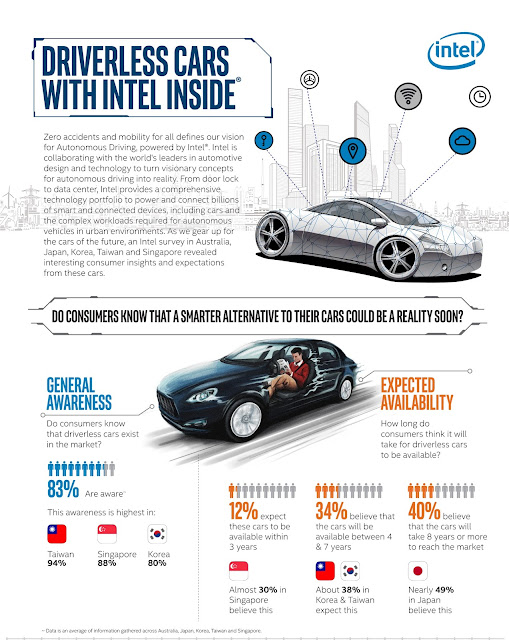Intel Study shows high degree of awareness about driverless cars in mature markets in Asia Pacific and Japan
Over 50% considering to buy a driverless car or use it as a taxi when commercially available
Singapore, December 15, 2016
— According to an Intel sponsored survey conducted in select mature
markets in
Asia Pacific and Japan, there is a high degree of awareness of
driverless cars among respondents. Over 51% respondents showed
willingness to buy or use a driverless car as a taxi, when available.
Interestingly, non-drivers showed a higher interest in using
a driverless car as compared to drivers.
— According to an Intel sponsored survey conducted in select mature
markets in
Asia Pacific and Japan, there is a high degree of awareness of
driverless cars among respondents. Over 51% respondents showed
willingness to buy or use a driverless car as a taxi, when available.
Interestingly, non-drivers showed a higher interest in using
a driverless car as compared to drivers.
The
“Autonomous Driving” survey, conducted by Intuit Research, polled 1250
respondents from five countries:
Australia, Japan, Korea, Singapore and Taiwan. The survey was conducted
online and covered car owner-drivers as well as non-drivers who use a
taxi at least once a month.
“Autonomous Driving” survey, conducted by Intuit Research, polled 1250
respondents from five countries:
Australia, Japan, Korea, Singapore and Taiwan. The survey was conducted
online and covered car owner-drivers as well as non-drivers who use a
taxi at least once a month.
In
terms of benefits, driverless cars being environment friendly, allowing
a less stressful
commuting experience, easier parking, predictable commute time and the
fact that one can summon the car ranked high. Various aspects of safety
–
no safety
standards in place yet, cars may not recognize and work in a new
situation, possibility of it being hacked – were the main concerns.
Concerns were higher among non-drivers.
terms of benefits, driverless cars being environment friendly, allowing
a less stressful
commuting experience, easier parking, predictable commute time and the
fact that one can summon the car ranked high. Various aspects of safety
–
no safety
standards in place yet, cars may not recognize and work in a new
situation, possibility of it being hacked – were the main concerns.
Concerns were higher among non-drivers.
When asked about features they would like in their dream cars, over 60% of respondents wanted
their driverless car to be intelligent enough to avoid traffic jams as well as be able to charge on its own using solar energy.
their driverless car to be intelligent enough to avoid traffic jams as well as be able to charge on its own using solar energy.
“Driverless
cars is one of the most interesting manifestations of technology that
we will see
in the next three to five years as it will positively impact so many
segments of the society. In addition to being environment friendly,
these driverless cars have the potential to save human lives by
decreasing the number of accidents and allow mobility for
the elderly and the disabled. Intel is working with various car
manufacturers to help make what was once considered science fiction, a
reality,” said Jerry Tsao, vice president of sales and marketing group
and managing director, regional sales group, Intel
Asia Pacific and Japan.
cars is one of the most interesting manifestations of technology that
we will see
in the next three to five years as it will positively impact so many
segments of the society. In addition to being environment friendly,
these driverless cars have the potential to save human lives by
decreasing the number of accidents and allow mobility for
the elderly and the disabled. Intel is working with various car
manufacturers to help make what was once considered science fiction, a
reality,” said Jerry Tsao, vice president of sales and marketing group
and managing director, regional sales group, Intel
Asia Pacific and Japan.
Additional country specific survey findings:
- On
an average, respondents expect driverless cars to be commonly available
in their countries in about 6 years with Singaporeans hopeful of
seeing them on the road the soonest. In fact, close to 30% of
Singaporeans surveyed felt they will have driverless cars commonly
available within 3 years. - Not
only does Taiwan show a very high degree of awareness about driverless
cars at 94%, it also showed a very high inclination to buy driverless
cars at 83%, whereas only 24% Australians showed interest in buying. - Among those who would consider a driverless car, 45% would be willing to concede a high degree or full autonomy** to the car.
- 47%
would be willing to pay a premium of over 20% for a driverless car.
Willingness to pay a premium is highest in Korea (62%) and lowest
in Singapore (37%).
For the LATEST tech updates,
FOLLOW us on our Twitter
LIKE us on our FaceBook
SUBSCRIBE to us on our YouTube Channel!





